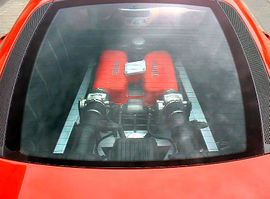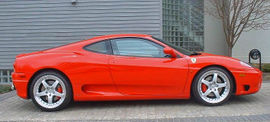Ferrari 360
| Ferrari 360 GT Race Car | |
| Ferrari 360 Modena, Spider, Challenge Stradale | |
|---|---|
| Manufacturer: | Ferrari |
| Class: | mid-engined coupe |
| Production: | 1999 — 2004 |
| Predecessor: | Ferrari F355 |
| Successor: | Ferrari F430 |
| Body Styles: | Berlinetta Spider |
| Engines: | 3.6 L V8 |
Ferrari 360 is the name given to three models of Ferrari cars: the Ferrari 360 Modena, an enclosed two-door coupe; the Ferrari 360 Spider, a two-door convertible; and the Ferrari Challenge Stradale, the bare-bones version of the 360 Modena. All have eight-cylinder engines and aluminum chassis. The 360 was replaced by the Ferrari F430 in 2005.
360 Modena


Description
Intended as successor to the F355, the 360 Modena features styling by Pininfarina, significant weight reduction, and an improved mid-mounted V8 engine; it is the first production Ferrari to be constructed entirely of aluminum. Its six-speed gearbox is available as a manual or F1 electrohydraulic shift. The car went into production in 1999.
Specifications
Dimensions
- Overall length: 4,477 mm (176.3 in)
- Overall width: 1,922 mm (75.7 in)
- Height: 1,214 mm (46.6 in)
- Wheelbase: 2,600 mm (102.3 in)
- Front track: 1,669 mm (65.7 in)
- Rear track: 1,617 mm (63.6 in)
- Weight: 1,290 kg (2,844 lb)
- Kerb weight: 1,390 kg (3,064 lb)
- Weight distribution: 43/57% front/rear
- Fuel capacity: 95 L (25.1 US gal)
Engine
- No. of cylinders: 90° V8 F131
- Bore & stroke: 85 by 79 mm (3.34 by 3.11in)
- Unit displacement: 448.2 cc (27.36 in³)
- Total displacement: 3,586 cc (218.84 in³)
- Maximum power: 294 kW (400 bhp) @ 8,500 rpm
- Maximum torque: 373 Nm (275.6 lb.ft) @ 4,750 rpm
Performance
- 0-60 : 4.3 sec
- 0-100 : 9.8 sec
- 0-1/4 mile : 12.6 @ 114mph
- Top Speed : 191 mph
360 Spider
Description
The 360 Spider is Ferrari's 20th road-going convertible and certainly its most advanced to date. It is simply the convertible version of the 360 Modena and its specs match those of the Modena almost exactly.
Specifications
Dimensions
- Overall: length 4,477 mm (176.3 in)
- Overall: width 1,922 mm (75.7 in)
- Height: 1,235 mm (48.6 in)
- Wheelbase: 2,600 mm (102.3 in)
- Front track: 1,669 mm (65.7 in)
- Rear track: 1,617 mm (63.6 in)
- Weight: 1,350 kg (2,976 lb)
- Kerb weight: 1,450 kg (3,197 lb)
- Weight distribution: 42/58% front/rear
- Fuel capacity: 95 L (25.1 US gal)
Engine
- No. of cylinders: 90° V8 F131
- Bore & stroke: 85 by 79 mm (3.34 by 3.11in)
- Unit displacement: 448.2 cc (27.36 in³)
- Total displacement: 3,586 cc (218.84 in³)
- Maximum power: 294 kW (400 bhp) @ 8,500 rpm
- Maximum torque: 373 Nm (275.6 lb.ft) @ 4,750 rpm
Performance
- 0-60 : 4.5 sec
- 0-100 : 10.1 sec
- 0-1/4 mile : 12.7 @ 112mph
- Top Speed : 186 mph
2002 Ferrari 360 Spider
- 2002 Ferrari 360 Spider 1.jpg
- 2002 Ferrari 360 Spider 2.jpg
- 2002 Ferrari 360 Spider 3.jpg
- 2002 Ferrari 360 Spider 4.jpg
- 2002 Ferrari 360 Spider 5.jpg
- 2002 Ferrari 360 Spider 6.jpg
- 2002 Ferrari 360 Spider 7.jpg
- 2002 Ferrari 360 Spider 8.jpg
- 2002 Ferrari 360 Spider 9.jpg
- 2002 Ferrari 360 Spider 10.jpg
- 2002 Ferrari 360 Spider 11.jpg
- 2002 Ferrari 360 Spider 12.jpg
- 2002 Ferrari 360 Spider 13.jpg
- 2002 Ferrari 360 Spider 14.jpg
- 2002 Ferrari 360 Spider 15.jpg
- 2002 Ferrari 360 Spider 16.jpg
Challenge Stradale

Description
The Ferrari tradition, epitomized by the F50 model, is one of stripped-down performance and not of luxury. This tradition has recently been let go in favor of the leather and ornamentation of the 360 Modena and 575M Maranello, but Ferrari returned to its roots for the Challenge Stradale. It is a two-door coupe and is essentially the 360 Modena from the outside, though its aerodynamics have been reworked slightly. The main differences are a stripped-out aluminum chassis (causing a significantly lighter vehicle), an upgraded 3.6-liter V8 engine, improved suspension and brakes, and a Formula One-style sequential gearshift.
It was officially introduced in March of 2003 at the Geneva International Motor Show and went into production shortly therafter.
Specifications
Dimensions
- Overall length: 4,477 mm (176.3 in)
- Overall width: 1,922 mm (75.7 in)
- Height: 1,199 mm (47.2 in)
- Wheelbase: 2,600 mm (102.4 in)
- Front track: 1,669 mm (65.7 in)
- Rear track: 1,617 mm (63.7 in)
- Kerb weight: 1180 kg (2,601 lb)
- Fuel capacity: 95 L (25.1 US gal)
Engine
- No. of cylinders: 90° V8 F131
- Bore & stroke: 85 by 79 mm (3.34 by 3.11in)
- Unit displacement: 448.2 cm³ (27.36 in³)
- Total displacement: 3.586 L (218.84 in³)
- Compression ratio: 11.2:1
- Maximum power: 425 bhp (317 kW) at 8500 rpm
- Maximum torque: 275.6 lb.ft (373 Nm) at 4750 rpm
Performance
- 0-60 : 4.1 sec
- 0-100 : 9.6 sec
- 0-1/4 mile : 12.4 @ 115mph
- Top Speed : 190 mph
Also See
| < Ferrari timeline 1948–1967 | Ferrari timeline 1960s-1990s | Ferrari timeline 1990–Present > | |||||||||||||||||||||||||||||||||||||||
| Type | 1960s | 1970s | 1980s | 1990s | |||||||||||||||||||||||||||||||||||||
| 0 | 1 | 2 | 3 | 4 | 5 | 6 | 7 | 8 | 9 | 0 | 1 | 2 | 3 | 4 | 5 | 6 | 7 | 8 | 9 | 0 | 1 | 2 | 3 | 4 | 5 | 6 | 7 | 8 | 9 | 0 | 1 | 2 | 3 | 4 | 5 | 6 | 7 | 8 | 9 | ||
| 8 cylinder | Mid-engine berlinetta | 308 | 308 i | 308 QV | 328 | 348 | 360 | ||||||||||||||||||||||||||||||||||
| 208 | 208 Turbo | GTB/GTS Turbo | F355 | ||||||||||||||||||||||||||||||||||||||
| Mid-engine 2+2 | 308 GT4 | Mondial 8 | Mondial QV | Mondial 3.2 | Mondial t | ||||||||||||||||||||||||||||||||||||
| 208 GT4 | |||||||||||||||||||||||||||||||||||||||||
| 12 cylinder | Boxer berlinetta | 365 BB | 512 BB | 512i BB | Testarossa | 512TR | F512M | ||||||||||||||||||||||||||||||||||
| Grand tourer | 250 | 275 | 365 GTB/4 "Daytona" |
550 Maranello | |||||||||||||||||||||||||||||||||||||
| America | 330 | 365 | |||||||||||||||||||||||||||||||||||||||
| 2+2 coupé | 250 GT/E | 330 GT 2+2 | 365 GT 2+2 | 365GTC/4 | GT4 2+2 | 400 | 400 i | 412 | 456 | 456 M | |||||||||||||||||||||||||||||||
| Supercar | 250 GTO | 250 LM | 288 GTO |
F40 | F50 | ||||||||||||||||||||||||||||||||||||
| Sold under the Dino marque until 1976; see also Ferrari Dino | |||||||||||||||||||||||||||||||||||||||||
